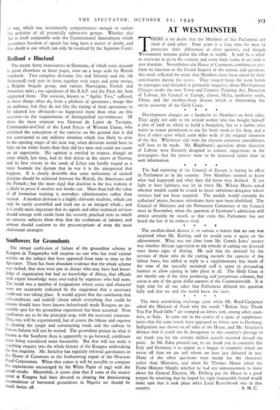AT WESTMINSTER
* * * a
Development charges are a headache to Members on both sides. They apply not only to the retired worker who has bought himself a plot of land on which to build a bungalow, but to a barber who wants to renew permission to use his front room as his shop, and a host of other cases which seem miles wide of the original intention of the Act. Whichever side wins the election extensive amendments will have to be made. Mr. Blackburn's questions about direction of Labour were blatantly designed to counter suggestions in the newspapers that the powers were to be increased rather than to seek information.
* * * * The bad reporting of the Council of Europe is having its effect in Parliament as in the country. Few Members seemed to know what had happened and what they did know they disliked. If not light at least lightness was let in when Mr. Wilson Harris asked whether medals could be issued to those substitute-delegates whose services had not been required. The medals would certainly be collectors' pieces, because substitutes have now been abolished. The Council of Ministers and the Permanent Committee of the Council meet in November, when the question of Germany's admission will almost certainly be raised, so that even this Parliament has not heard the last of its embryo rival.
* a a * The swollen-shoot disease is so serious a matter that no one was surprised when Mr. Keeling said he would raise it again on the adjournment. What was not clear from Mr. Creech Jones' answer was whether African opposition to the remedy of cutting out diseased trees shows signs of abating. He said that the demand for the services of those who do the cutting exceeds the capacity of the labour force, but added in reply to a supplementary that much oi the time of the specially recruited staff is spent in persuading farmers to allow cutting. to take place at all. The Gold Coast is not merely one of the most promising and prosperous colonies, but cocoa is one of the great dollar-earners of the Commonwealth. It is high, time for all our sakes that Parliament debated the question fully and that we and the world knew the facts. . • • The most astonishing exchange came when Mr. Boyd-Carpenter asked the Minister of Food why the words "Britain Says Thank You For Food Gifts" are stamped on letters sent, among other coun- tries, to Italy. It came out in the course of a spate of supplemen- taries that the same words have appeared on letters sent to Germany. Indignation was shown on all sides of the House, and Mr. Strachey's defence that it could not be derogatory to this country's prestige to say thank you for the seventy million parcels received missed the point. As Mr. Eden pointed out, to say thank you to countries like Italy and Germany is to appear as a beggar to countries which are worse off than we are and whom we have just defeated in war. Many of the other questions were meant for the electorate rather than Ministers, and when Sir Thomas Moore asked the Prime Minister bluntly whether he had any announcement to make about the General Election, Mr. Driberg put the House in a good temper by retorting that he hoped his right honourable friend would make sure that it took place when Lord Beavcrbrook was in this


































 Previous page
Previous page